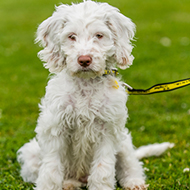
Concerning results from Dogs Trust cost of living survey
More than one in 10 dog owners have been forced into debt in order to care for their dog, a new survey from Dogs Trust has found.
Carried out by YouGov last week, the survey found that 13 per cent of dog owners were forced into debt to care for their dog, while 33 per cent of owners would be forced to borrow money if met with an unexpected veterinary bill of £100.
With Dogs Trust centres already at capacity, and other animal charities similarly stretched, Owen Sharp, chief executive of Dogs Trust, shared his worries: “It’s hugely worrying that dog owners are falling into debt with the cost of looking after their dogs, and a stark indicator of how seriously the cost of living crisis is impacting on our dog-loving nation.
“We’re not laying the blame at the door of vets, who are themselves impacted by rising costs, leading to higher fees.
“But we have a situation in which many of the UK’s dog owners are having to make cost-cutting decisions that could be harmful to their dog’s health, such as skipping vaccines and worming treatments, and some dogs are missing emergency treatment because their owners can’t afford it.”
Other concerning figures from the survey showed that 84 per cent of dog owners have experienced a rise in costs associated with keeping their dog in the last six months, 77 per cent said that their pet food had increased in price, 43 per cent told the charity that the cost of routine vet appointments has increased.
The increase in the cost of living has already forced dog owners to make difficult decisions about their dogs' care, with one in 10 saying that they had delayed seeking veterinary treatment for non-routine procedures, and nine per cent had delayed or missed routine appointments.
Owen continued: “I’m really worried that, despite our best efforts, the sector will reach a point where we’ve reached the limit of what we can do, and we’ll be forced to turn away dogs in need.”
Image (C) Dogs Trust



 The RCVS has announced a new version of its 1CPD mobile app, with enhanced features for veterinary surgeons and veterinary nurses to record their continuing professional development.
The RCVS has announced a new version of its 1CPD mobile app, with enhanced features for veterinary surgeons and veterinary nurses to record their continuing professional development.